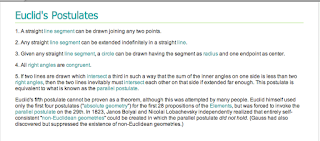Euclid's Elements, one of my fondest moments from High School ( the worst was
Biology which I dropped for Physics; Save the Frogs!). I thoroughly enjoyed all the
problems but, as I recall, the introduction to the work was awesome and somewhat
mysterious. Let us look again at the Axioms and Postulates:
Today, both concepts are defined as self-evident truths but what is the difference
between them. The clue to the issue comes from Aristotle, in whose work on
Logic the Organon, axioms are referred to as primary notions with which one
builds demonstrations. Postulates, in turn, define the field of study: it comes from
asking for, here a line, a point, a circle, parallels. The statement of the fifth postulate is
cleverly presented, ie those lines where angle deviation from the parallel
will be on the same side. Euclid comes a bit later than Aristotle, but his influence
here is clear as well. He thought that logical connections came from experience
itself, whose richness informed the mind, because there was just too much otherwise.
Interestingly, the followers of Aristotle quickly came to the view that he had been
right, and that all one needed to do was to understand him, a view that prevailed to
the Renaissance. Ironic and misguided: philosophy is an acitvity. Plato knew that
and Aristotle himself wrote on the dialectic. Perhaps it was the heaviness of the
written word that came to prevail...



No comments:
Post a Comment